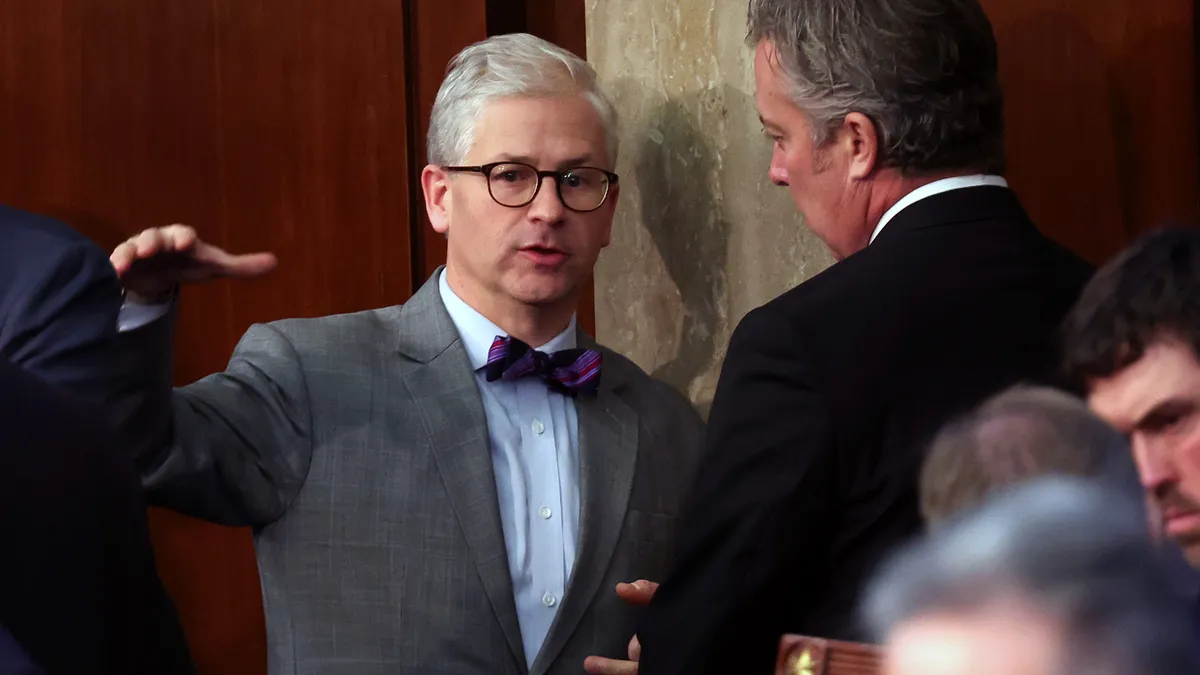The chair of the House Financial Services Committee and 28 other Republicans in Congress urged regulators Wednesday to withdraw a July proposal that would require the biggest U.S. banks to hold roughly 19% more capital and align them more closely with the Basel III endgame.
“As issued, the proposal lacks justification, lacks rigorous quantitative analysis, and is procedurally flawed,” Rep. Patrick McHenry, R-NC, and the other lawmakers wrote to Federal Reserve Chair Jerome Powell, Acting Comptroller of the Currency Michael Hsu and Federal Deposit Insurance Corp. Chair Martin Gruenberg.
The letter comes on a day Powell is set to testify in front of the committee — although the central bank chair is not the Fed official closest to the proposal. That would be Michael Barr, the Fed’s vice chair for supervision.
McHenry and two dozen other Republican lawmakers wrote Barr in September, calling the July proposal “underdeveloped” and “deficient” and assailing it for its “paltry” impact analysis.
Regulators extended the comment period on the proposal through mid-January and launched an initiative to collect more data from affected banks — effectively, a “second quantitative impact study,” Barr said.
McHenry on Wednesday criticized that “belated” request, adding that the supplemental data collection and comment period extension came as regulators “recogniz[ed]” the proposal’s “weaknesses.”
McHenry demanded “rigorous” quantitative analysis, adding that any new resulting proposal be issued first as an advance notice of public rulemaking.
That would stand as a test of the clock for partisan interests on both sides. Republicans opposed to the proposal may rather see the rulemaking process stretch into next year on the chance that November’s presidential election would bring an occupant to the White House who would disagree with the Democrat-led proposal and that Republican lawmakers would take steps to roll it back or let it die without passage. Democrats, meanwhile, may prefer a quick rulemaking so the policy could be codified before, or in case, the White House goes red.
Time is on McHenry’s mind, too, in that, with the comment period over, regulators have not yet indicated how and when they would further develop the proposal, he said.
However, Barr has begun rewriting the proposal, working with Powell, who is seeking "significant" changes, according to a government official who spoke to Reuters.
The rewrite is expected to significantly reduce the increase in capital that large banks would be forced to hold, eight industry executives told the wire service — especially in how banks calculate potential losses from operational risks.
Banks had been pushing regulators to reduce the risk weights for fee income associated with lending services, such as investment banking, Reuters reported Wednesday. Officials are also expected to at least reduce higher risk weights on mortgages to low-income borrowers and on renewable energy tax credits, the wire service’s sources said.
The capital requirements proposal is arguably the most contentious banking regulation in decades, drawing what McHenry deemed an “unprecedented number” of comments. More than 97% “call for withdrawal, a reproposal, or otherwise expressed significant concerns” with all or part of the rule, McHenry said Wednesday, citing a February analysis by the law firm Latham & Watkins.
“This broad-based opposition makes clear that it is not just the banking industry crying wolf,” McHenry wrote Wednesday.
Among McHenry’s concerns is how those comments will change the proposal.
Barr, in January, said the comments “will feed into how we develop the final proposal.”
The Fed has received the letter and plans to respond, a spokesperson for the central bank told American Banker.













